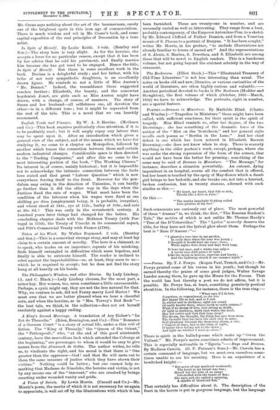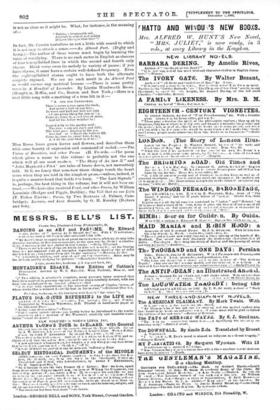POETRY.—Dramas in Miniature. By Mathilde Blind. (Chatto and Windus.)—" Tragedies
in Miniature " these might have been called, with sufficient exactness, for their spirit is the spirit of tragedy. Miss Blind reminds us, after her degree, of the two Brownings ; she has something of the dramatic force of the author of the " Blot on the 'Scutcheon," and her general style recalls such poems as " Bertha in the Lane." And her chief defect is one which has been noticed in Elizabeth Barrett Browning,—she does not know when to stop. There is scarcely anything in the older poetess's work, except, perhaps, where she was under the strong repression of the form of the sonnet, that would not have been the better for pruning ; something of the same may be said of Dramas in Miniature. " The Message," for instance, describes a situation powerfully. An outcast, dying impenitent in an hospital, scorns all the comfort that is offered, but her heart is touched by the sprig of May-flower which a dumb girl brings to her bed-side, and she breaks out, not into a hurried, broken confession, but in twenty stanzas, adorned with such similes as this :- " My heart, my heart, that felt so sick, Throbs like a hive in June."
Or this :—
" The murky lamplight blinking rolled Like guineas at my feet."
Such ornaments are curiously out of place. The most powerful of these " dramas" is, we think, the first, " The Russian Student's Tale," the motive of which is not unlike Mr. Thomas Hardy's " Tess of the D'Urbervilles." The " Lyrics " scarcely deserve the title, for they have not the lyrical glow about them. Perhaps the best is " Rose D'Amour :''—
" I planted a rose tree in my garden, In early days when the year was young ; I thought it would bear me rose', roses,
While nights were dewy and days were long.
It bore but once, and a white rose only— A lovely rose with petals of light ; Like the moon in heaven, supreme and lonely ; And the lightning struck it one summer night."
Poems. By. T. J. Powys. (Kogan Paul, Trench, and Co.)—Mr. Powys printed some of his verses in his youth ; but though he earned thereby the praise of some good judges, Walter Savage Landor among them, he gave up the Muses for the Forum. That the world has lost thereby a poet we do not affirm, but it is possible. Mr. Powys has, at least, something genuinely poetical about him. In the following, for instance, there is the true ring:— "What care if I lie low,
Forgotten, or remembered, so she live Her happy life at last, and so I rest In silence and in darkness, sight nor sound Of earth known there, where earth to earth returns ?
What if no dream of love, love strong as death, Of light in darkness, dawn that wakes the dead, May yet revive and visit that long sleep ? The dream, the thought, the thing has once been mine. The thought that has been life shall still be mine, Still gleaming through the deepening gloom, a star, (' Fairest of stars, last in the train of night, If better thou belong not to the dawn ')
And light me whither I most go alone."
There is spirit in the ballad-poems which make up " Owen the Valiant." Mr. Powys's metre sometimes admits of improvement. This is especially noticeable in " Egeria."—Days and Dreams. By Madison Cawein. (G. P. Putnam's Sons.)—Mr. Cawein has a certain command of language, but we must own ourselves some- times unable to see his meaning. Here is an experience of a bewitched knight :—
" But never of any manhood weakened; The heart in my breast was wax ; Myself but the hide of an image Out-etuffed with the bands of flax: She spun and she smiled a spinning, A spindle of blood red flax."
That certainly has difficulties about it. The description of the feast in the harem is put in gorgeous language, but the language
is not as clear as it might be. What, for instance, is the meaning of- " Rubies, a tragacanth red, Angered in armlet and anklet Dragon-like eyes that bled"?
In fact, Mr. Cawein tantalizes us not a little with sound to which it is not easy to attach a sense.—An Altered Part. (Digby and Long.)-The author of these verses must begin by learning the rules of versifying. There is no such metre in English as stanzas of four ten-syllabled lines in which the second and fourth only rhyme. Blank verse owes its melody to variety of pause; if you have rhyme, it must have a certain well-defined frequency. Even the eight-syllabled stanza ought to have both the alternate couplets rhymed. We see no such merit in An Altered Part as would excuse any metrical license. —There is some pretty verse in A Handful of Lavender. By Lizette Woodworth Reese. (Houghton, Mifflin, and Co., Boston and New York.)-Here is a neat little song with something of a true lilt in it :-
" A ONO POR CANDLEMAS.
There's never a rose upon the bush,
And never a bud tin any tree;
In wood and field nor hint nor sign Of one greeu thing for you or ti 0. Come is, come in, se eat love of mine, And let the bitter weather be !
Coated with ice the garden wall ; The rive. reeds are stark and still; The wind goes • lunging to the sea, And last ee 'a flakes the hollows fill. Come in, rome iu, sweet, love, to me,
And let the year blow as it wi.1 I "
Miss Reese loves green leaves and flowers, and describes them with sonic beauty of expression and command of inelod..—The Vision of Barabbas, and other Poems (H. Frowde.,--The poem which gives a name to this volume is probably not the one which will pl-use most readers. " The Story of As.,inw.,11" and "John Maynard s Pilot '• are tales of brave deeds, not unworthily told. St 11, we fancy that somehow these things touch the heart more when they are told in the simplest prose,-unless, indeed, it is quite a master-hand that holds the harp. "The Last Signals is, perhaps, the best thing in the volume, but it will not bear ex- tract.—We have also received Fund, and other Poems, by William Larminie (Hodges and Figgis, Dublin) ; The Veil that no one Lifts (T. Fisher Unwin( ; Poems, by Two Brothers (J. Palmer, Cam- bridge); Lorenzo, and Love Bonnets, by G. H. Kereley (Bickers and Son).



















































 Previous page
Previous page